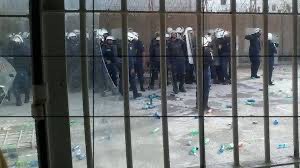|

Bahrain: The rate of human rights violations does not suggest an implementation of human rights reforms in the near future On April 8, 2024, the Bahraini authorities released hundreds of political detainees. The number of political detainees had been more than 1,300 in Bahraini prisons, and after the releases, it became more than 560 detainees. This step was considered by independent human rights organizations a positive one that restored some, but not all, of the rights of some citizens, who had been arrested for political reasons. The independent human rights organizations considered that releasing political detainees must be supplemented with reparation and compensation for them, in addition to dropping arbitrary judicial rulings against them, on which their imprisonment was based. Moreover, those involved in a whole process of violations of citizens’ rights must be held accountable. This process begins with filing criminal charges based on political grounds, followed by interrogation procedures carried out under pressure and torture. Then, citizens are subjected to biased and unfair judicial trials, in which arbitrary sentences are issued. Afterwards, many prisoners of conscience are arbitrarily detained for more than a decade under prison conditions where prisoners are exposed to various forms of torture and ill-treatment. Thus, the independent human rights organizations stressed the necessity of releasing all political detainees and not some of them, as a basic condition for achieving the effective restoration of rights to citizens who were arrested on political grounds. Hence, the independent human rights organizations welcomed the step of releasing some political detainees and contributed to drawing a road map explaining how to implement transitional justice that ensures that previous violations or actions that cause them are not repeated. The families of the detainees who were not released hoped for the quick release of their family members as well. In fact, at first glance, the releases seemed to the families of the detainees and to those following the human rights and political situation in Bahrain, as if they were a prelude to other positive steps. However, things stopped at that point, and the authorities continued to arbitrarily arrest more citizens, the most recent of whom was five citizens arrested in June over participating in a peaceful demonstration in support of Gaza. Sympathy for Palestine has always been a charge punishable by the Bahraini authorities, not only after October 7, 2023, but it increased after that date, as the authorities summoned, arrested, or issued sentences against (76) citizens on charges related to expressing solidarity with Palestine. Prison conditions remained the same in terms of restricting, torturing, and depriving prisoners of conscience of medical treatment, whether in some individual cases or collectively. The Jaw Central Prison administration used excessive force against the detainees who staged a sit-in in the prison corridors during the second half of April to protest depriving them of their rights, which led to the injury of some detainees. In addition, the prison administration also tried to put pressure on the detainees who staged a sit-in during the month of May, by reducing the meals provided to them to be limited to dry bread, instead of taking their rightful demands into serious consideration and putting an end to the miserable prison conditions that the detainees complain about. Moreover, 8 detainees were transferred to the security isolation building for other reasons. One of the prominent cases of individual violations was the continued deprivation of sixty-year-old detainee Muhammad Hassan Al-Ramel of medical treatment. He has been suffering for seven years from chronic and dangerous diseases such as twisted vertebrae and ulcers in the stomach, while the prison administration deliberately deprives him of medical treatment and of being checked by specialized doctors at the hospital. The prison administration canceled at least six medical appointments scheduled for him between 2021 and 2024, and did not respond to his repeated hunger strikes. Another prominent case that reflects the prison clinic disregard for the health of detainees is the case of detainee Ahmed Abbas Abdul Shahid Al-Ghasra, who suffered in May from a fracture and deformity in his upper jaw at the hands of the prison clinic doctor, Muhammad Sa’ad. The latter attempted to extract the detained patient's tooth instead of repairing it without asking the patient for permission. He also cut the patient's gums in a way that caused bleeding, which necessitated an urgent transfer of the patient to the hospital and a surgical operation. The patient’s upper jaw remained permanently deformed. There were 24 other individual cases in April and May only. The Bahraini authorities’ continued arrest of citizens on political grounds and the torture of political detainees indicate no change in the systematic repressive behavior of the authorities, even after the release of a large number of political detainees in April. This makes citizens constantly afraid of being arbitrarily arrested at any moment, which has been the norm since the movement of February 14, 2011. The number of arbitrary arrests of citizens between 2019 and May 2024 reached (1,267) cases, including (160) cases of arrest of children, including one girl, Hour Yaqoub Al-Ajmi, from the Northern Governorate, who was arrested for 3 days based on a subpoena in 2020. The arrest cases included (13) against women, (2) against citizens with special needs: Ali Muhammad Rahmatullah and Hani Muhammad Al-Najjar, (21) against religious scholars, (17) against religious reciters (rawadeed), (3) against sports players: Muhammad Khalil Ibrahim (bowling player), Hussein Issa Aburweis (beach soccer player), and the child at the time, Muhammad Habib Yahya Abdullah Badaw (handball player). The arrests per year were as follows: (541) arrests in 2019 (185) arrests in 2020 (166) arrests in 2021 (102) arrests in 2022 (216) arrests in 2023 (57) arrests in 2024 (January to May) |